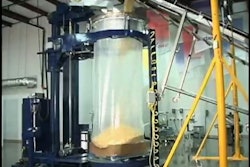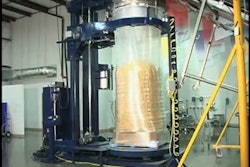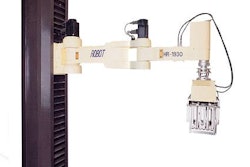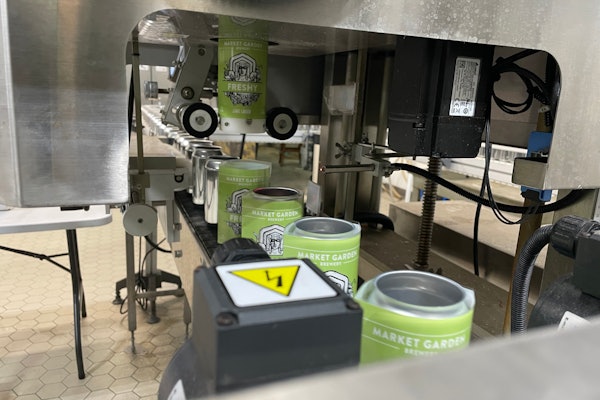Among the critical issues that face packaging professionals today is the all-important task of training the work force of tomorrow.
Regular readers of Packaging World have probably noticed our ongoing coverage of packaging education programs that are offered at universities like San Jose State, University of Florida, and so on. But no less promising are the initiatives now bubbling to the surface at the nation’s technical colleges. This story takes a look at three such colleges, one in the Midwest and two out East, all focused on essentially the same critical task: Preparing the packaging workforce for a world in which electronics, mechatronics, and a familiarity with information technology are every bit as important as an awareness of mechanics and mechanical engineering.
Our story begins at Alexandria Technical College in Alexandria, MN. That’s where Dr. Kenneth Ryan, director of the college’s Center for Automation and Motion Control, is preparing a National Science Foundation grant proposal that will permit the establishment of a Packaging Automation Center of Excellence.
“The goal is to establish a skills standard for technicians working with packaging machinery,” says Ryan. “What programming skills, what troubleshooting skills, what motion control skills would you be expected to have if you worked for a packaging machinery OEM, an end-user, a supplier of automation technology, or an integrator? That’s what we want to establish, maybe even a certification through OMAC, something similar to the Certified Automation Professional program offered through the International Standards Association.”
Ryan says the NSF funding will pay for three key things, the first of which is an industry survey to identify needs and establish a skills standard.
“The National Skills Standards Council has a template for skills standards across all manufacturing,” says Ryan. “We’ll take that template and ask the packaging automation stakeholders—OEMs, end users, integrators, and technology suppliers—what they need in a packaging machinery technician. This would be done through some combination of email and mail.”
A long look at today’s schools
With a skills standard in hand, Ryan’s group would next focus on existing educational institutions geared to meet the needs of packaging automation stakeholders. Existing curricula at these schools would be analyzed and graduates interviewed.
“My hunch is that such an analysis will show a sizeable gap between what the stakeholders say they need and what is being provided,” says Ryan. “You’ll probably find a number of these institutions are providing mechanical engineering programs, but if you ask what they are teaching about servos or motion control or programming, you won’t get too far. Make no doubt about it, those mechanical engineering programs taught engineers how to build the mechanical equipment that industry has simply had to have over the past 20 years, and they did a damned good job. But packaging equipment today is increasingly less mechanical in nature and revolves more around servos, and networks, and programming. It’s about software engines built on IEC 61131-3, an international standard for industrial control programming. At the center of excellence, the curriculum would be tightly focused on these and other mechatronic subject areas.”
Ryan points out that certain packaging automation stakeholders have approached him and his colleagues at Alexandria for help in developing IEC 61131-3 training. And while his organization is happy to provide such a service, he thinks it’s the NSF that should be funding that kind of training.
“Everyone moans about the state of manufacturing in this country and what should be done about it,” says Ryan. “One thing that can and should be done is to endorse programs that are embracing standards and developing curriculum with standards in mind. The curriculum at the center for excellence will hammer away at this idea of international standards.”
The third step to be funded by Ryan’s NSF grant proposal is the development of a curriculum based on the needs discovered during steps one and two. This curriculum would be the foundation upon which the Packaging Automation Center for Excellence would be built. Ryan would like the center to be more web-based than physically located in any particular facility. But the center itself will be brokered by the Center for Automation and Machine Control at Alexandria Technical College.
So what’s needed now? Industry support.
“NSF supports the goal of a center of excellence,” says Ryan, “but they are asking for more evidence of industry support. We want to bowl NSF over with letters of support from Kraft, Unilever, P&G, IoPP, PMMI, and others. People have to quit waiting around for this to happen. They have to get on board.
“The overall goal is to produce durable, transportable, configurable technicians. The key is ‘durable.’ We have to give the technicians information that lasts more than 18 months. ‘Configurable’ is the other key. We have to give technicians trans-industry capabilities. They need to understand automation, not just packaging automation. They need to be configurable.”
Industry support
Representatives of end-user companies who support the idea of the Packaging Automation Center for Excellence include Andy McDonald, at Unilever.
“We’re bringing more and more sophisticated packaging equipment into our factories, and we don’t always have available to us the skills to adequately manage that equipment,” says McDonald. “It’s not just at Unilever, but across the board. That’s why we’re very excited about the prospect of having a national curriculum for packaging automation technician, that people will be able to go to school and acquire qualifications. It will create a pool of qualified and experienced people that we can tap into.”
Bradley Carson, senior manager of production engineering at AstraZeneca, also sees a need for a workforce better trained in mechatronics.
“As technology rapidly increases on the modern-day plant floor, we can’t have one-off solutions or trial-and-error troubleshooting,” says Carson. “We need to have plant-floor people adapting best practices from our Information Technology/Information Services people. We need to be adapting and developing standards to create a basis that we can train people consistently throughout the plant.”
Better training at the technical college level could be a big part of the answer, says Carson.
“People coming out of technical college may be trained in Industrial Ethernet, TCP/IP, XML and so on,” says Carson. “But they may not know how to put them all together, how to integrate these components in a line control or full SCADA system, for example, as it relates to a cartoner or thermoformer on the plant floor. What we’re finding is that we have to focus on training that helps people integrate all the layers together. It’s a reflection of how the plant-floor skill requirement is changing. You can’t simply be a specialist anymore. To be successful on the plant floor these days, you have to not only understand the newer technologies but also have a feel for their interdependency. What it comes down to is that today’s plant-floor people should have some of the skills that, traditionally at least, an engineer or an IT/IS person would have had in the past.”
It’s worth noting that while AstraZeneca has a keen interest in seeing technical colleges and other outside institutions improve their educational offerings, the firm also is investing in its own internal training mechanisms. About a year ago, the Training and Communications Group was reorganized to include a specialist who has a background in industrial training and communications. Carson sees real value in having the training duties managed and executed by a professional trained in training rather than by his own engineering group.
“We’re engineers, not training gurus,” says Carson. “Proper and professional training is required these days, because we’re not only dealing with technical content, we’re dealing with adult learning patterns, diversity in the work force, leaps in technology, paradigm shifts, soft skills issues, and so on.”
The Pennsylvania consortium
Alexandria Technical College’s NSF grant is just one training and education initiative aimed at boosting the skill set of today’s packaging technicians. Another notable effort is being spearheaded by Reading Area Community College (RACC) of Reading, PA, where a unique consortium of public and private-sector organizations is hoping to develop a Center of Excellence in Packaging Operations. (Despite the similar sounding name, it is an initiative completely separate from that of Ken Ryan and Alexandria Technical College.) The consortium has hired industry consultants Keith Campbell, former executive director of the OMAC Packaging Workgroup, and Stan Telson, president of QSSP Group. Together they are identifying technology-related skills that manufacturers in south central Pennsylvania would like the workforce to have. They’ll also review existing curricula offered by the region’s educational institutions—RACC, Lancaster County Career and Technology Center, Harrisburg Area Community College, Thaddeus Stevens College of Technology, Penn State Berks/Lehigh College—to identify opportunities where industry requirements can be better met by new or modified course offerings and programs.
“In that 10-county area of Pennsylvania, there are more than 500 food, pharmaceutical, and beverage plants,” says Campbell. “The workforce development agencies in the region have identified packaging as a key sub sector, and they see support of packaging machinery know-how as essential to the region’s manufacturing base.”
Campbell believes the 10-county initiative is right on target.
“Much as the work force wasn’t properly prepared for the introduction of CNC technologies some years back, today’s work force is again behind the times,” observes Campbell. “Machines that are increasingly electronic rather than mechanical in their operating principles are a challenge to people who are used to fully mechanical machines.”
Campbell also believes a little attitude adjustment would go a long way toward improving the skill set of tomorrow’s packaging machinery technicians.
“To parents of students, ‘manufacturing’ is like a dirty word,” says Campbell. “But the fact is we’re graduating more four-year people than we need and not enough two-year people. Nor are we directing kids in high school to what are really good jobs in manufacturing. People flipping burgers could be working on packaging machines. But they need direction, and that’s not being done in the U.S. In Europe, it is. There, a lot of time is invested in giving technicians a sound education in manufacturing.”
RACC’s Center of Excellence in Packaging Operations will be a place where “a sound education in manufacturing” will be provided. It will be housed in a brand new building, the Schmidt Training & Technology Center. According to John DeVere, associate dean of academic affairs at RACC, the Center will offer training to workers already in industry as well as offering a program for students who are fresh out of high school or college and haven’t joined the work force yet.
“For students who are already employed in industry, we want to establish a computer-based approach, monitored by an instructor, that will allow the student to work independently,” says DeVere. “That way, the student’s employer won’t have to worry so much about releasing workers from their duties in the plant. The students will have pass cards so they can access the center 24/7 to progress in their training. It’s more flexible than the lockstep approach traditionally taken in training and education, and that’s one thing we’re hearing loud and clear from employers in the region: Keep it flexible.”
A minor in mechatronics
And finally, at Stevens Institute of Technology in Hoboken, NJ, two recent initiatives should pay packaging dividends down the road. First, the mechanical enginering department is installing a solid-dose pharmaceutical packaging line and is building a required course for all seniors around the line. Also in the mechanical engineering department, a minor in mechatronics will soon be offered.
“It started with a single course in mechatronics,” says Charles Geraldi, the teacher of said course whose day job is in sales at Gottscho. “By offering a minor in mechatronics, people will be able to develop a real feel for the subject.”
That should make Alexandria College’s Ken Ryan happy. The way he sees it, the rise of mechatronics is among the most significant shifts to hit the packaging automation scene in a long time, so anything that today’s educators can do to make the work force ready for it is a step in the right direction.
“We see a 90-degree paradigm shift staring us in the face and we see technicians going off the road,” says Ryan. “We’re just trying to put up a guard rail.”
For more information on any of the programs described in this story, contact Packaging World Editor Pat Reynolds at [email protected].
























